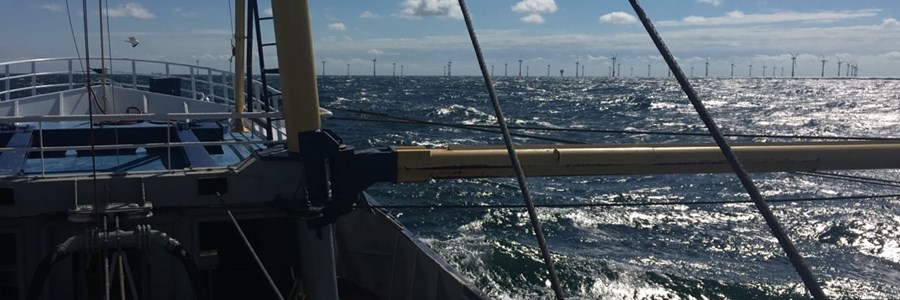Fishermen blown away by offshore wind energy escalation plans

As part of the Green Deal, the European Commission has announced the goal to increase the EU’s offshore energy production twenty times to achieve climate neutrality by 2050. The European Commission aims to meet this target while at the same time managing the maritime space sustainably. A recent study [1] commissioned by the EU Executive body puts forward a set of recommendations for positive interactions between fisheries and offshore wind farms. The fishing sector is sceptical about the main findings of this study which downplays the conflicts and echoes the myth of a so-called “happy co-existence” built by the wind energy sector. Likewise, the authors neglect the negative environmental impacts of windfarms and even more so the socio-economic consequences on the fishing communities.
Fishermen and women are guardians of the sea. Their activity directly relies on the good health of marine ecosystems and fish stocks. However, their traditional profession is in peril. According to a recent scientific study [2], the rise in offshore wind production projected in the EU will deploy large industrial structures at sea with far reaching consequences for the environment. The long term effects of a large rollout of offshore projects risk impairing the healthy functioning of the seas and their ecosystems as a result of negative cumulative effects [3]. According to the main EU fishing associations, Europêche and EAPO, the study not only overlooks these severe impacts but also the conclusions of the latest report from the Commission on the implementation of the Marine Strategy Framework Directive (MSFD), alerting that renewable energy production is one of the “main activities reported under the MSFD causing physical loss of benthic habitat”. The sector argues that the expected consequences represent a direct threat to the main goals of the Biodiversity Strategy, and the good environmental status of our waters and life within.
Javier Garat, President of Europêche, declared: “Fishing communities will be the first ones to suffer from these serious environmental impacts, as commercial species and whole ecosystems are bound to be affected by the massive expansion of offshore wind farms. On top of that, our fishermen are continuously losing valuable fishing grounds and access to healthy stocks due to the growing use of marine space by new maritime activities and area closures for nature conservation”.
Europêche and EAPO unanimously ask policy makers: “Not to change fishers by windmills, adopt a precautionary approach and halt the current expansion of offshore wind parks until research has come up with answers to the many existing knowledge gaps”.
Pim Visser, President of EAPO, concluded “the most concerning is the “win-win” rhetoric developed in the study. The paradigm shift towards the industrialization of the sea as a source of renewable energy is at the expense of renewable food production, fishers, their families and their communities, without any sensible assessment”.
ENDS
[1] Dupont, C., Herpers, F., & Le Visage, C. (2020). Recommendations for positive interactions between offshore wind farms and fisheries. Publications Office of the European Union. https://doi.org/10.2826/017304
[2] Boon, A., Caires, S., Wijnant, I. L., Verzijlbergh, R., Zijl, F., Schouten, J. J., & Kooten, T. (2018). The assessment of system effects of large-scale implementation of offshore wind in the southern North Sea. Deltares, 11202792-002-ZKS-0006
[3] Including local wind patterns, wave generation, tidal amplitudes, stratification of the water column, dynamics of suspended particles and bedload transport of sediment.
Press contacts:
- Rosalie Tukker, Policy Advisor of Europêche: +32 (0)2 230 48 48, tukker@europeche.org website: www.europeche.org
- Guillaume Carruel, Policy Officer EAPO: +32 59 43 20 05, carruel@eapo.com website: www.eapo.com
Sources: Europeche
Tags: offshore wind farms, offshore wind energy, european commission, climate neutrality, maritime space, co-existence, environmental impacts, socio-economic consequences, fishing communities, guardians of the sea, marine ecosystems, MSFD, benthic habitat, biodiversity strategy, good environmental status, renewable food production, fishers